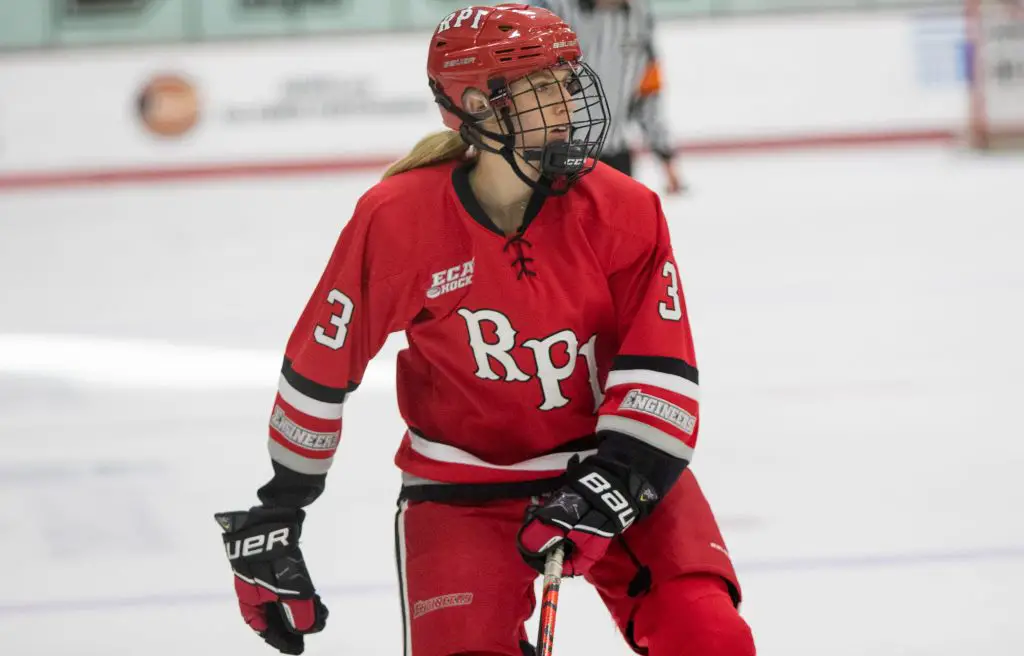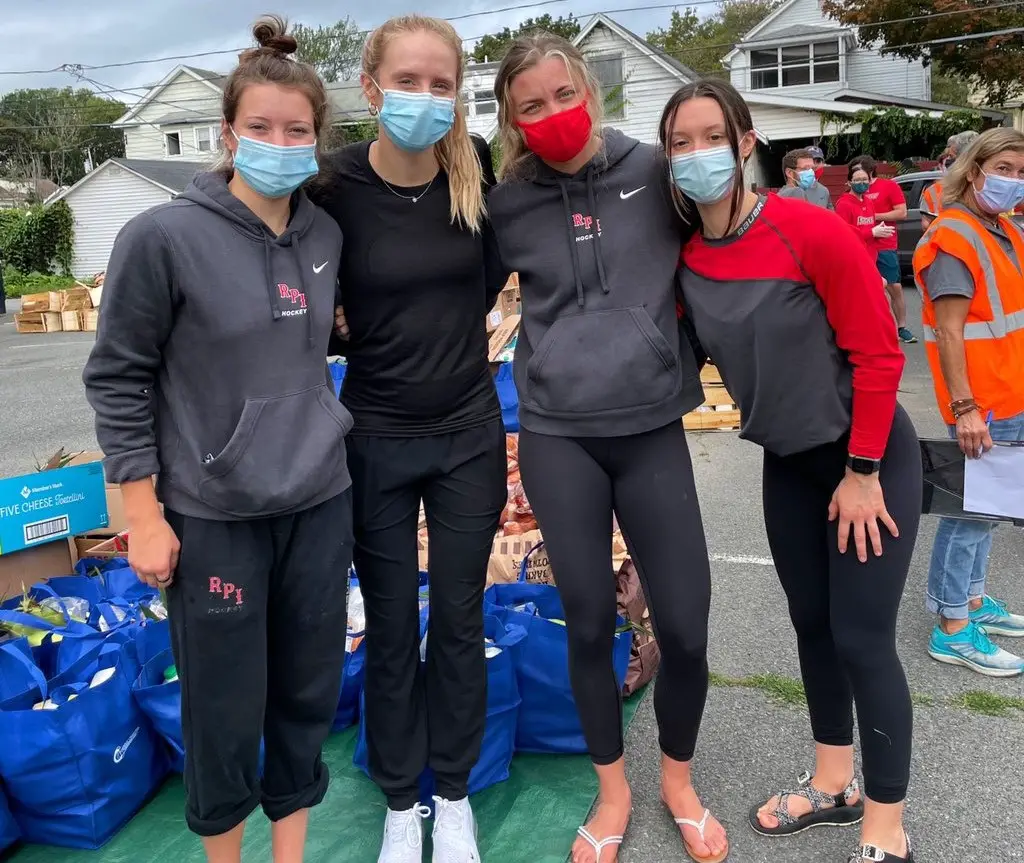
Rensselaer junior defender Hannah Price was an outspoken advocate in her community long before she stepped on campus in Troy, N.Y.
But with the transition to college and the pressures of being a student athlete, heading into her sophomore year, she hadn’t yet explored opportunities to give back in Troy.
In the fall of 2020, RPI was under a policy of de-densification and Price and her classmates were not allowed on campus. But she felt it was important to be in town and close to teammates. Eventually, the team was informed their hockey season was canceled and Price found herself with time on her hands.
“I had all this energy and I wanted to be able to put it towards something more positive,” said Prince. “In essence, it was a way for me to take back control over my life by volunteering. It was also an outlet.”
It may not seem so on the surface, but there is actually a lot of crossover between volunteering and playing hockey, said Price.
“I see volunteer work as being really similar to hockey, actually, in that you work as part of a larger team, incrementally working towards a larger goal. Those small actions add up and you can truly make a difference in the larger scheme of things,” she said.
That Price chose to spend the pandemic helping others is no surprise to teammate Nyah Phillip.
“She’s one of the most genuine, selfless and inspirational people that I’ve ever played with. She’s an energy giver. People feel that energy and are more likely to reflect that back,” Phillip said.
Those qualities show through in Price’s service, but also in the locker room, where she is a mentor whose thoughtfulness and empathy make her a great teammate and better friend.
Price, who is majoring in Economics and Sustainability Studies, began working with the Food Recovery Network, collecting leftover food from dining facilities and connecting with homeless shelters. She also worked with Troy Street Soldiers, handing out water, food, and basic necessities to those who need them. She is also bilingual and has helped as a translator for Spanish-speaking members of the unhoused population in Troy. Little by little, her small actions continue to add up.
She has found how much overlap there is between the issues that are important to her which has helped her to understand how to combine what she has learned from internships, volunteer work and research into a future career.
“(Sustainability is about) how we can better our environment, but also our communities living within our environment. In an urban context, that looks more like food insecurity and food waste. That’s something that you can align together and can be issues that can help solve one another,” Price said.
She credits her time at RPI with enabling her to see the crossover among so many issues facing society. A class called Designing Climate Justice opened her mind to the intersections between broader societal issues and environmental issues.
“Something that really interests me is being able to tackle environmental issues while also supporting communities and the people that inhabit them. This year especially, I’ve really been able to explore those avenues”, Price said.
As a research assistant on an international and interdisciplinary soil contamination study happening in Troy and Arica, Chile, Price has worked to develop field test kits so that citizens can test their soil for heavy metals such as arsenic and lead. She is working to empower communities, build advocacy and arm citizens with the information they need to be active participants in political discussion and decisions that are being made about the environments where they live.
“I’m in the process of editing a paper that’s going to be published for this study about repairing relations with city soils through community science,” she said. “That’s been a very formative experience that I think speaks to hopefully the future I want to have – being able to combine science, public policy, advocacy for communities and grassroots organization.”

As a food policy intern with the city of Pittsburgh, Price said the goal was making her hometown a more food secure city for all of its residents. She worked to create a community working group that could connect organizations in a network capable of making large-scale change in regard to food waste and food insecurity. The experience of forging relationships with the goal of building interconnected networks to tackle large-scale problems in the city was different from her on-the-ground, person-to-person worth with the unhoused in the community of Troy.
There is importance in human connection and finding tangible ways to make a difference at a micro and local level. Price said that when issues feel daunting, immobilizing and too big to tackle, volunteering locally helps alleviate feelings of intimidation or hopelessness by showing how much the smallest thing makes a difference.
The stigma of being unhoused often comes with a callous disregard for basic humanity. The materials Troy Street Soldiers distributes make an immediate and measurable impact, but Price points out that just as important is the human connection and recognition of humanity that comes in face-to-face interactions.
Understanding that part of her advocacy came early for Price, who worked at a special needs camp for three summers as a teenager and earned a grant to spend two weeks at a special needs orphanage in Bolivia, where finding joy in simple things most people take for granted inspired her to want to provide social connection for others.
“That was a great experience that taught me a great deal about developing creative and empathetic approaches to communication, especially when interacting with students and parents,” she said. “It taught me the power of being able to just change someone’s day.”
RPI women’s hockey coach Bryan Vines said that Price has already made a massive impact in the community of Troy, giving of herself and inspiring her teammates to get involved, as well.
“I think this award is built for people like her. At RPI our saying is ‘Why not change the world?” She was doing that long before she got here. She had changed the world. She’s already made massive changes for people. I know she has much, much more to do. She’s going to do some amazing things for other people and for the world.”
When the team returned to the ice this season, there was less free time for on-the-ground volunteering, so Price shifted her focus to organization. Now she schedules and coordinates volunteers to ensure the community advocacy and connections that were forged in the pandemic are not lost.
On the ground and in government, with massive marches and individual interactions, Price is using her academic, athletic and volunteer experiences to inspire change.


